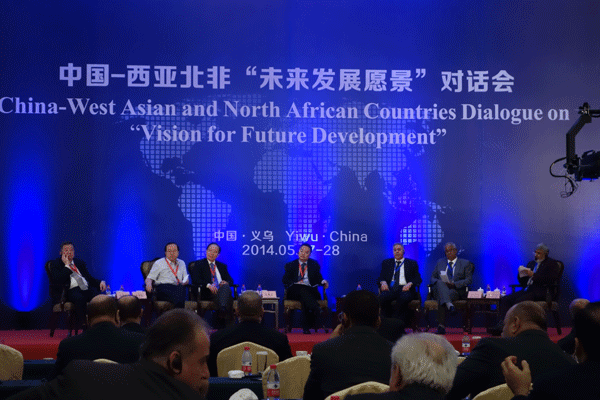China and WANA look into future development
Updated: 2014-05-30 10:59
By Mao Jing (chinadaily.com.cn)
|
||||||||
China-WANA (West Asia and North Africa) dialogue on "Vision for Future Development" began in China's Yiwu city, Zhejiang province on May 27. As many countries in the West Asia and North Africa are undergoing transformation and development, the relationship between China and WANA enjoys new historical opportunities.
Reform and transformation for WANA
Reform and transformation for WANA has proved a tortuous process due to both internal conflict between secular and religious power and the external interference of western powers. The so-called "Arab Spring" of three years ago might not be as successful as people may think – it has neither gone the way the West hoped nor brought benefit to the Arab peoples. Syrian people are still striving under gunfire and there seems to be of little hope for the peace between Palestine and Israel.
Hamidreza Taraghi, chairman of the International Affairs Committee of Iran's Islamic Motalefeh Party has accused western countries of trying to impose their democracy on the Middle East. He said long-term unrests and turmoil in the Middle East reveals that the West is afraid of a rising of Asia.
Wu Sike, China's special envoy on the Middle East issue said adhering to one of the "Five Principles of Peaceful Coexistence", China always supports WANA countries to safeguard their sovereignty and territorial integrity. China encourages other countries to stand by Palestine. He is also grateful for the support Arabian countries give China in fighting terrorism.
Sudan's Vice President Bakri Hassan Saleh praised China's diplomatic policy of mutual respect instead of pressing other countries, saying he hopes such relationship to be a model for nation-to-nation relationships.
To resolve long term disturbances in the region, An Huihou, special researcher at the China Institute of International Studies suggested the nations need a capable government to find a way suitable for their own national conditions. Stabilizing the economy and developing people's livelihood are the most pressing issues.
Egypt may prove a good example of this. With most guests at the conference expressing confidence in presidential frontrunner Abdel Fattah al-Sisi's winning of the election, Yoursi Ahmed Ibrahim Gouma, researcher at the Egyptian Pyramid Research Center said Sisi will not return to the authoritarian and autocratic style of rule for which Hosni Mubarak was known before his ousting in a popular uprising in 2011.
While An questioned terrorists who cause chaos both in and outside the region in the name of Islamism, Yoursi Ahmed said that it is time to clear some extremist religious people, especially to redefine the Brotherhood. "The Brotherhood can continue to exist as a religious community but cannot participate in politics and make violence", he said.
Hamidreza Taraghi also said that peace, friendship, science and benevolence are the key to Islamism which has nothing to do with terrorism and extremism.
Opportunities and challenges in future cooperation between China and WANA countries
While the US has been less dependent on the petroleum from the Middle East due to its shale gas "revolution" and Europe continues to experience economic recession, Asia is gradually becoming a great potential for WANA countries, particularly China, whose demand for energy resources is expanding and whose dream is to realize the nation's rejuvenation, sovereignty and territorial integrity, a goal many WANA countries share.
Last year, Chinese President Xi Jinping proposed the strategic vision of building the "Silk Road Economic Belt " and "21st Century Maritime Silk Road", two initiatives of which WANA countries are key partners. "The active involvement will not only complement and effectively link up each other's resource endowment, capital advantages and market potential and create new jobs, but also give momentum to countries in the region in their economic cooperation with other countries in the world," Ma Biao, evice-chairman of the 12th National Committee of the CPPCC (Chinese People's Political Consultative Conference) said.
Asadollah Asgaroladi, President of the Iran-China Chamber of Commerce and Industries spoke highly of the "Silk Road Economic Belt", saying it provides a platform not only for trades, but also enhancing political trust and heart-to-heart exchanges between ordinary peoples.
Delegates from Palestine, Lebanon, Iraq, South Sudan and many others talked about their current domestic situation, expressed the wish to cooperate with China, to learn from China's development experience and appealed for China's investment and technical support in their countries in the fields of oil, hydroelectricity and aviation. They also hoped China can play a comprehensive role not only in economics, but also politics and culture. Hot issues such as the Israeli - Palestinian dispute needs more countries which value justice to mediate.
The huge differences between Chinese and Arabian culture and language impede interaction between the two areas, so "to disseminate Chinese culture and language to the Arabian world, especially to establish more programs for youth exchange, to allow more students from the WANA countries to study in China is what we need to maintain a long-term relationship," Benna Ahmed, a member of the political bureau of I'Union Constitutionnelle said.
Related story:
Yiwu - From poor city to starting point of the 'New Silk Road'Most Viewed
Editor's Picks

|

|

|

|

|

|
Today's Top News
H1-B visa spouses may soon get to work in US
Obama's speech disappoints
China Inst. marks 88th with gala
Singers try out for China's American Idol
Xi urges more jobs in Xinjiang
China to lower market access to army equipment
Residents collect anti-terror info
Russian troops leave Ukraine border
US Weekly

|

|














